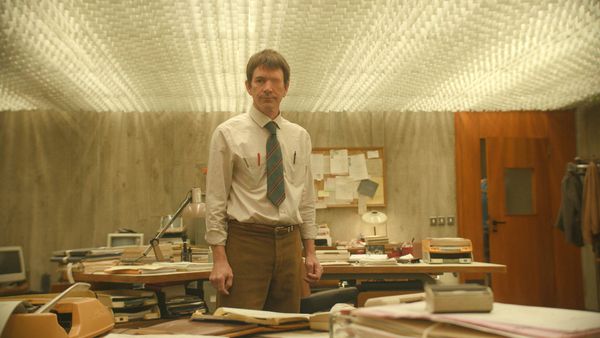 |
| The Wild Fields Photo: Courtesy of Tallinn Black Nights Film Festival |
The Wild Fields (Dike Pole)
"The road back home is a one-way trip," 30-year-old Herman Korolyov (Oleg Moskalenko) is told as he returns from Karkhiv - where he works as an "independent expert" - to the rural part of Donbass where he grew up. Herman intends to stay only one night, sorting out the affairs of his brother's petrol station now that his sibling has unexpectedly left the country - but with Russian gangsters intending either to buy or violently seize the property from him, Herman's indecision gradually turns into a determination to stay on and to defend what is rightfully his, whatever the cost.
Serhiy Zhadan's Voroshilovgrad was presciently published in 2010, four years before the outbreak of the war in Donbass - but in adapting it with the benefit of hindsight, Jaroslav Lodygin's feature debut The Wild Fields now serves openly as an allegory of Russia's cross-border land grabs in Ukraine, and as a call to arms for locals in their resistance to invasion. While his brother fled, and flirtatious schoolgirl Katia plans to leave, Herman remains behind, forming an alliance with two playmates from his childhood and with the business' feisty accountant Ohla. The story is a rambling, rambunctious modern western, peppered with plenty of absurdist humour - and even if by the end it has run out of steam, perhaps even of coherence, it is always appealing to see a ragtag group of shabby underdogs taking a last stand against apparently overwhelming force. It is an open question, though, whether viewers will be willing to accept the suggestion - made not just by a character, but by the film's own final image - that Herman's newfound nationalism is an expression of the divine will.
Foam At The Mouth (Ar Putam uz Lupam)
Opening with a disturbing shot of a giant boar not so much wallowing as writhing in the forest mud, this third feature from Latvian writer/director Janis Nords sets the animal and human worlds into collision. Still recovering from an unspecified accident that has left him with an artificial leg and persistent spinal problems, ex-cop Didzis (Vilis Daudzins) rears and trains a trio of police dogs to attack on command. As his wife Jana (Ieva Puke), a school sports therapist with a love of lying, embarks tentatively upon an illicit affair with 17-year-old pupil Roberts (Raimonds Celms), she crashes her car into a rabid boar, bringing its infection home with her on the vehicle's bumper. Racked with pain, jealousy and an angry sense of his own uselessness, Didzis circles Roberts in encounters that are increasingly vicious on both sides - and once unleashed, this increasingly violent love/hate triangle blinds Didzis to what is going on with his beloved dogs.
Although Foam at the Mouth is at heart an intense character study of three vulnerable people caught at a crossroads in their lives as they become infected with deceit, recrimination and unhinged rage, its closest analogue is, improbably, John Carpenter's SF horror The Thing (1982). For here, too, there is the snowy setting, the (emotionally, at least) isolated characters, and the contagious condition of madness (both metaphorical and literal) carried in from the cold by dogs. Unfolding mostly in a mode of wintry social realism, but with an occasional drift into stylised canine dreams, Nords' film reduces its human characters to their most animalistic instincts and appetites, and expertly compounds its tensions to breaking point.
Fire Lily (Tuliliilia)
The fire lily from which Estonian writer/director Maria Avdjushko's feature debut derives its title - and which appears at several junctures within the film - is, significantly, a hermaphroditic plant, both male and female, and capable of fertilising itself. This is one key (from a whole bunch) to the story of a woman falling unexpectedly pregnant at a transitional point in her life.
In her late thirties, infertile and alone, ophthalmologist Pia (Ingrid Isotaam) is still recovering from a bitter divorce, half-heartedly refurnishing her new apartment, and looking for love and companionship, when she suddenly finds her domestic space filled with her vacationing best friend's young son Peetrike (Rasmus Kallas), with her own much younger sister Kaia, and with kindly bar owner Kaarel (Johann Urb). To this modern family structure there is also another regular visitor, unseen though heard and tangible, at first entering Pia's bedroom - and her body - at night, and soon making its presence felt elsewhere and during the day too, violently protecting his hostess from any male threat.
This invisible figure, inhabiting the void left by Pia's absent father and husband, soon leaves Pia, impossibly, with child - and as Fire Lily offers a compelling confusion of explanatory frames, whether rational, religious or supernatural, for a pregnancy that might be miracle or curse, it also explores a single, independent, middle-aged woman's place in a world that is often hostile to her. Mixing elements of horror films The Entity (1982) and Rosemary's Baby (1968), but playing out as a feminist mystery, this is an ambiguous, enigmatic fable, pregnant with possibilities for its elusive interpretation.
 |
| Keep An Eye Out Photo: Courtesy of Tallinn Black Nights Film Festival |
Keep An Eye Out (Au poste!)
In the opening scene of Keep An Eye Out, a moustachioed man conducts an open-air orchestral performance of Mozart while dressed only in a pair of bright red underwear, before fleeing the scene as the police arrive. This scenario comes from a familiar pattern of anxiety dreams, forming an apt introduction to the film's oneiric (dis)orientations - but the arrival of the police provides a perfect segue to the police station where most of the film's remainder will unfold.
In an office there, chief inspector Buron (Benoît Poelvoorde), not exactly helped by his gormless one-eyed colleague Philippe (Marc Fraize), interrogates Louis Fugain (Grégoire Ludig), who, after discovering a man's bloody corpse beneath his apartment late at night, has become chief suspect in the case. Unfolding a banal yet bizarre reconstruction of events, and having to account for the seven different occasions that he was spotted (by a nosy neighbour) leaving and returning to his apartment that night, Fugain finds the flashback form through which he delivers his narrative becoming irrationally interpenetrated by his present - and while he seems guileless enough and repeatedly proclaims his innocence, we know that he is hiding one almighty skeleton in the closet…
The latest theatre of the absurd to come from writer/director/DoP/editor Quentin Dupieux (Rubber, 2010; Wrong 2012; Reality, 2014), Keep An Eye Out is a hilarious interrogation of life, in all its mundanity, as a stage for the shlumpily surreal. If Philippe tends to litter his sentences with the modifier "actually" - a habit which he has picked up from his policewoman wife (Anaïs Demoustier), and which soon spreads infectiously to everyone's utterances - Dupieux's film serves to drop the mask and the lift the veil on any fixed notion of what"actually" might mean. Here we are constantly wrong-footed by a bewildering collision of different narrative digressions, appetitive drives, arbitrary incidents and subjective worlds, until a final coup de théâtre is delivered, and then itself upended. It may be easy to get lost in all these paradoxical layerings of reality, but the sound of your own laughter is always there as a reliable guide.
- Read capsule reviews of Between Covers and Yung
- Read capsule reviews of Lorik, Erased, Deep Rivers and The World Is Yours
- Read capsule reviews of As I Fall and Happiness Is A Warm Gun
- Read capsule reviews of Slam and Potential Victim
- Read further full reviews and features from Tallinnn Black Nights Film Festival here





















